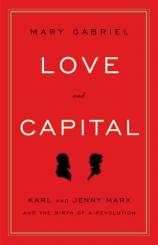Love and Capital: Karl and Jenny Marx and the Birth of a Revolution
Review
Love and Capital: Karl and Jenny Marx and the Birth of a Revolution
I am ashamed to admit that not once during my stereotypically angsty collegiate study of communist theory did I wonder whether or not Karl Marx had a wife. Somehow, despite the theory’s demands for equality, the feminine face of communism has been obscured.
"In this beautiful and comprehensive biography, Gabriel restores the voices of Jenny Marx and her children to their rightful place in the birth of a movement that would come to dominate political discourse in the 20th century."
Mary Gabriel’s new book, LOVE AND CAPITAL: Karl and Jenny Marx and the Birth of a Revolution, is therefore a long overdue addition to the body of biographical information on the Father of Communism. It brings to light Marx’s most devoted disciple: Jenny von Westphalen, a woman with the fortitude to bear financial insecurity, danger, exile and personal betrayal, all for the sake of her husband’s beliefs. In this beautiful and comprehensive biography, Gabriel restores the voices of Jenny Marx and her children to their rightful place in the birth of a movement that would come to dominate political discourse in the 20th century.
Gabriel advances her subject with the measured patience of a committed biographer. Each chapter documents a year in the life of the Marx family. This attention to detail creates a narrative that is both expository and overwhelming, as the seismic ups and downs of the family’s fortunes are enough to give the reader seasickness. Yet peeping into the personal lives of Karl and Jenny Marx is never boring, and the pages in this remarkable biography turn quickly. Gabriel is an engaging narrator, though at times more sympathetic towards her subjects than she is required to be. She takes seriously her historical responsibility to represent all sides. When relating Karl’s affair with his children’s nurse, Gabriel carefully reserves judgment:
“It would be easy to blame Marx alone for such an unforgivable act of betrayal, but that would ascribe a timidity and vulnerability to Lenchen that were not reflected in her character…Perhaps Marx and Lenchen were drinking (a favorite recreation for them both), or he was in need of consolation because Jenny was away and Engels was preparing to leave, so he simply turned to Lenchen.”
However, this subtlety is perhaps wise, considering that readers can easily come to their own conclusions about Marx based on the facts alone. Even treated sympathetically, Marx comes off as the story’s anti-hero; he is the archetypal genius with grating social skills and a tumultuous personal life. It doesn’t take much cajoling from Gabriel for her audience to conclude that Marx was often a negligent father and husband, more attentive to his own theoretical advancement than to the comfort or well-being of his family. As the book wears on, readers finds themselves rooting for Jenny, commiserating with her suffering and delighting in her success. Much of her life seems to have been consumed by waiting: waiting to marry, waiting for financial security, waiting for her husband to finish his masterpiece, waiting for the revolution to come. Jenny Marx is the perfect example of how we often live in expectation, and while we are waiting, life happens.
The mid-19th century was also a time of upheaval and revolution in Western Europe. Gabriel often pans out from her immediate subjects to the wider European scene, in order to demonstrate the context of her characters’ ideas and the motivational forces behind their actions. The result is a thorough history of an entire international opposition movement, in which Marx is but a piece.
Biographies such as Gabriel’s are crucial to understanding not only Marx’s personal life, but also his work and philosophy. It is easy to divorce the philosophy from the author. However, this tendency speaks to the fatal flaw of Communism as an enduring political structure. Philosophy is an abstract and pure medium, whereas the human philosopher cannot help but be flawed. Once countries like the Soviet Union and China began following Marx as their infallible visionary, they automatically undermined the egalitarian nature of his theory, which maintains that no man is above another. Looking to a single leader for the Communist Revolution ensures its failure; it leads to dictatorial rather than disseminated power.
In this way, Gabriel’s work is crucial. Marx did not create in a vacuum, and to reference only his colleagues and intellectual forbears would be an egregious oversight. Jenny was his secretary, confidante and intellectual equal; acknowledging her contribution more accurately distributes credit and supports the communist idea of communal collaboration.
In LOVE AND CAPITAL, Jenny Marx is lifted up as the true Mother of Communism, a woman of strength and substance, who steadfastly bore the initial birth pangs of a worldwide revolution.
Reviewed by Shelby Wardlaw on November 3, 2011
Love and Capital: Karl and Jenny Marx and the Birth of a Revolution
- Publication Date: September 14, 2011
- Genres: Biography, History, Nonfiction
- Hardcover: 768 pages
- Publisher: Little, Brown and Company
- ISBN-10: 0316066117
- ISBN-13: 9780316066112





